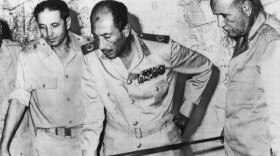
Tom Gjelten
Tom Gjelten reports on religion, faith, and belief for NPR News, a beat that encompasses such areas as the changing religious landscape in America, the formation of personal identity, the role of religion in politics, and conflict arising from religious differences. His reporting draws on his many years covering national and international news from posts in Washington and around the world.
In 1986, Gjelten became one of NPR's pioneer foreign correspondents, posted first in Latin America and then in Central Europe. Over the next decade, he covered social and political strife in Central and South America, the first Gulf War, the wars in the former Yugoslavia, and the transitions to democracy in Eastern Europe and the former Soviet Union.
His reporting from Sarajevo from 1992 to 1994 was the basis for his book Sarajevo Daily: A City and Its Newspaper Under Siege (HarperCollins), praised by the New York Times as "a chilling portrayal of a city's slow murder." He is also the author of Professionalism in War Reporting: A Correspondent's View (Carnegie Corporation) and a contributor to Crimes of War: What the Public Should Know (W. W. Norton).
After returning from his overseas assignments, Gjelten covered U.S. diplomacy and military affairs, first from the State Department and then from the Pentagon. He was reporting live from the Pentagon at the moment it was hit on September 11, 2001, and he was NPR's lead Pentagon reporter during the early war in Afghanistan and the invasion of Iraq. Gjelten has also reported extensively from Cuba in recent years. His 2008 book, Bacardi and the Long Fight for Cuba: The Biography of a Cause (Viking), is a unique history of modern Cuba, told through the life and times of the Bacardi rum family. The New York Times selected it as a "Notable Nonfiction Book," and the Washington Post, Kansas City Star, and San Francisco Chronicle all listed it among their "Best Books of 2008." His latest book, A Nation of Nations: A Great American Immigration Story (Simon & Schuster), published in 2015, recounts the impact on America of the 1965 Immigration Act, which officially opened the country's doors to immigrants of color. He has also contributed to The New York Times, The Wall Street Journal, The Washington Post, The Atlantic, and other outlets.
Since joining NPR in 1982 as labor and education reporter, Gjelten has won numerous awards for his work, including two Overseas Press Club Awards, a George Polk Award, and a Robert F. Kennedy Journalism Award. He is a member of the Council on Foreign Relations. A graduate of the University of Minnesota, he began his professional career as a public school teacher and freelance writer.
-
The death of President Hugo Chavez could mean as much for Cuba as it will for Venezuela. The Chavez government has heavily subsidized Cuba.
-
Audie Cornish talks to Tom Gjelten about what's next for Venezuela after President Hugo Chavez's death. He died Tuesday at the age of 58.
-
A new round of talks on Iran's nuclear program is under way. But international sanctions haven't led to the type of concessions the West hoped for, and prospects for a breakthrough are limited.
-
Some affected private companies are so frustrated by their inability to defend against attacks that they have opted to go on the offense themselves. Some cybersecurity firms are now marketing cyberweapons and attack strategies to companies that want to go after their adversaries.
-
In the past, security researchers who stumbled on a software flaw would typically report the flaw to the software's manufacturer. But that changed when cyberweapon designers started looking at these flaws as vulnerabilities that could serve as a back door into a computer network.
-
U.S. military commanders are emphasizing their readiness to defend the nation against cyberthreats from abroad. What they do not say is that they are equally prepared to launch their own cyberattacks against U.S. adversaries.
-
President Obama's nominee to run the CIA has his confirmation hearing Thursday afternoon. The hearing of White House counterterrorism chief John Brennan comes as lawmakers are studying a memo on drone strikes overseas. Robert Siegel talks to Tom Gjelten.
-
As Obama's chief counterterrorism adviser, John Brennan has been associated with some controversial policies, including the use of armed drones. It's unlikely his appointment as CIA director is in trouble, but he's likely to face questions on drones as well as the agency's interrogation policies.
-
As Arab-Israeli tensions grew in the fall of 1973, the CIA offered its analysis to President Nixon's administration: War was highly unlikely. The agency kept making that case right up to the time the war began.
-
Investors didn't panic after last week's attack, and oil and gas prices held steady. But if the attack on the gas complex signals the beginning of a new phase of terrorism in North Africa, energy companies and governments will need to make new assessments of the risks and benefits of investments.






